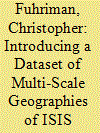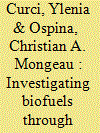|
|
|
Sort Order |
|
|
|
Items / Page
|
|
|
|
|
|
|
| Srl | Item |
| 1 |
ID:
188054


|
|
|
|
|
| Summary/Abstract |
This research proposes a methodology for extracting and analyzing geographical perspectives of terrorists and insurgents from online textual media. The information age has afforded organizations platforms that can be used to control their own media messages. Given that power, terrorist groups are able to create customized messages and define themselves in their own eyes on an international scale, often generating widespread sympathies and increased popularity. Within their online messaging, important information is provided that can potentially unveil geopolitical strategies. A mixed-method approach comprised of computer-aided content analysis, manual content analysis, and cartographic visualization is applied to ISIS’s Dabiq magazine as a case study to demonstrate the utility of this methodology. This research highlights the importance of considering the territoriality of terror groups and movements in geohistorical and present-day contexts.
|
|
|
|
|
|
|
|
|
|
|
|
|
|
|
|
| 2 |
ID:
150071


|
|
|
|
|
| Summary/Abstract |
Biofuel policies are motivated by a plethora of political concerns related to energy security, environmental damages, and support of the agricultural sector. In response to this, much scientific work has chiefly focussed on analysing the biofuel domain and on giving policy advice and recommendations. Although innovation has been acknowledged as one of the key factors in sustainable and cost-effective biofuel development, there is an urgent need to investigate technological trajectories in the biofuel sector by starting from consistent data and appropriate methodological tools. To do so, this work proposes a procedure to select patent data unequivocally related to the investigated sector, it uses co-occurrence of technological terms to compute patent similarity and highlights content and interdependencies of biofuels technological trajectories by revealing hidden topics from unstructured patent text fields. The analysis suggests that there is a breaking trend towards modern generation biofuels and that innovators seem to focus increasingly on the ability of alternative energy sources to adapt to the transport/industrial sector.
|
|
|
|
|
|
|
|
|
|
|
|
|
|
|
|
| 3 |
ID:
168675


|
|
|
|
|
| Summary/Abstract |
This paper models landscape sustainability in the oil-producing Niger Delta area of Nigeria. Simon decision making cycle (intelligence-design-choice) was used to examine landscape sustainability planning issues. This approach involves three levels of application namely intelligence, design, and choice. Probability topic model was used in R software to identify the key problems in the Niger Delta area as (1) oil spillage impacts on water/land use (landscape capital) and (2) militancy (vandalism) and leadership (planning). These problems significantly, affect the landscape capital in the Niger Delta area. System dynamic simulation was applied to evaluate landscape capital under different scenarios of vandalism and different levels of revenue allocation. The study found that the greatest landscape capital can be achieved in 18.25 years if the revenue allocation to the Niger Delta oil producing states is increased from the current level of 13 percent to 21 percent. These results are consistent with UNEP's report that highlights oil spillages in the Niger Delta area as affecting landscape sustainability in the area.
|
|
|
|
|
|
|
|
|
|
|
|
|
|
|
|
| 4 |
ID:
175267


|
|
|
|
|
| Summary/Abstract |
In this study, we investigated the changes in those technologies over time in the United States, European countries, Japan, and China, all of which have led the global nuclear energy industry. Using clustering analysis based on the patents that were applied to those regions from 1972 to 2014, we first identified 15 technological topics in nuclear waste management. Next, using technology network analysis, we examined the changes in these topics over time. The results show that regional conditions such as the history related to nuclear weapons, type of ideology, geological condition, resource situation, and international affairs are critical factors that influence the trends in nuclear waste treatment technologies. We revealed that majority of technology development is concerned long-term storage. This method can be useful for both the advanced countries and the latecomers. However, as the long-term storage is not final step in nuclear waste management, those late comers should gain technological competence for nuclear waste management by not only in-house R&D but also open innovation via licensing or joint R&D with the advanced countries to complete technologies for overall life-cycle of nuclear energy.
|
|
|
|
|
|
|
|
|
|
|
|
|
|
|
|
| 5 |
ID:
192947


|
|
|
|
|
| Summary/Abstract |
This study investigates the North Korean defector phenomenon by approaching YouTube as an internet forum for public discourse, using the novel analytic approaches of social network analysis, text mining and semantic analysis. The research produced three main findings. First, individual YouTube content creators are most influential in the video networks pertaining to the subject of North Korean defectors. Second, on YouTube space, the image of North Korea tends to be negative because of the prevalence of defectors' testimony of their life experiences. Finally, such negative narratives of North Korea on YouTube might have a negative influence by blocking the reunification of Korea. In conclusion, this study suggests the South Korean government and other relevant global actors should conduct thorough and continuous examinations of North Korean defectors' perceptions of South Koreans and vice versa. This study calls for the international community to take further action to formulate proper policy instruments.
|
|
|
|
|
|
|
|
|
|
|
|
|
|
|
|
| 6 |
ID:
193751


|
|
|
|
|
| Summary/Abstract |
Concerns about climate change and its potential economic impact have prompted policymakers and institutions to introduce standards and principles to encourage the disclosure of company risks related to climate change. Past research demonstrated that such disclosure positively impacts firm stock prices. This study analyzes the magnitude and significance of climate risk disclosures within 10-K and 10-Q reports of U.S. companies through the application of novel methods in text mining and social network analysis. Furthermore, it measures the level of attention directed towards climate change at the firm level by analyzing transcripts from earnings conference calls. The study contributes to the literature by investigating the effect of climate risk disclosure on firm market value and considering where such disclosure occurs. The findings demonstrate a positive relationship between climate risk disclosures and firm value. However, this relationship can turn negative when the attention to climate change intensifies. The results of this study are of particular relevance for practitioners and policymakers who are provided with a novel instrument to quantify the magnitude of climate change risk disclosure in textual data. Regulators can identify firms particularly exposed to climate change and create incentives for disclosure, especially when firms may be disincentivized to share information about climate change risks.
|
|
|
|
|
|
|
|
|
|
|
|
|
|
|
|
|
|
|
|
|